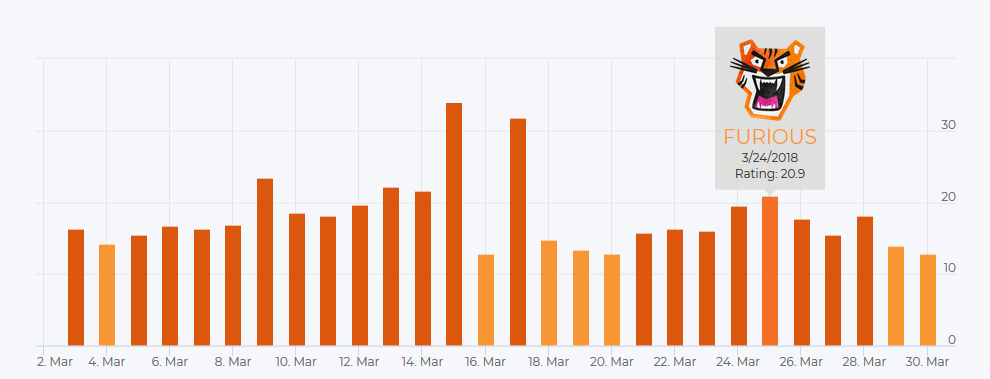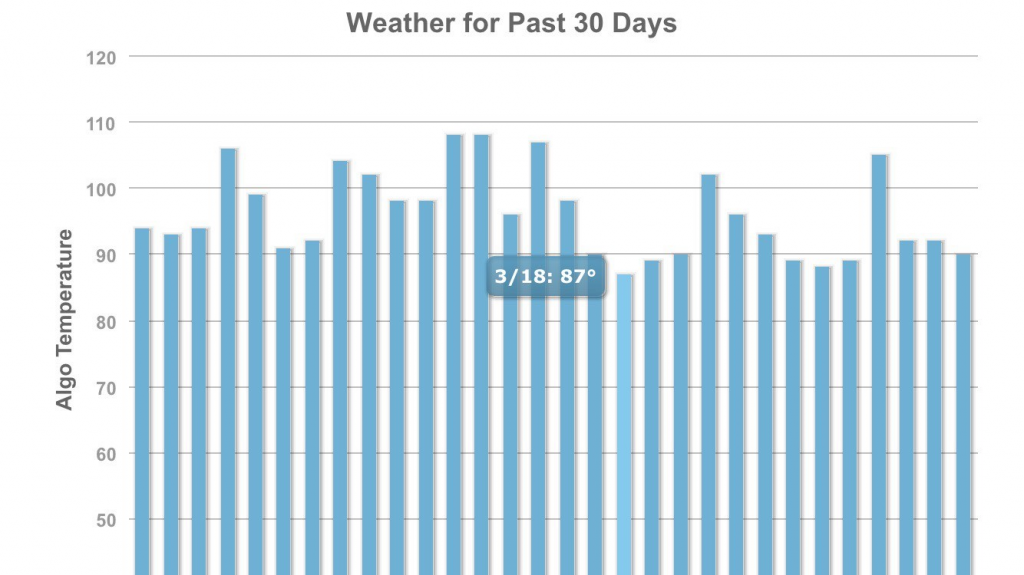What is MozCast, and why do we at SLS Consulting write a new blog installment on it almost every month? Well, it has to do with search engine rankings. One day, your website might be on page one of Google, and you’re feeling just fine. The next, you’ve dropped down to spot 20—what’s going on?
The answer is usually that Google is tweaking its search engine algorithm…and that’s why we go to our friends over at MozCast, who put together a set of 1,000 hand-picked keywords that helps track when Google makes changes. Moz then assigns a temperature to reflect how much fluctuation is taking place in Google’s search results, and we bring that forecast straight to you!
The higher the temperature, the more likely that changes are taking place behind the scenes of Hummingbird (that’s the name of Google’s algorithm as of 2013). For example, 70° is a fair day, where your website ranking should stay put. The hotter the temperature, the more likely your website may move up or down. So. Let’s get to it…
How “hot” was it in March 2018, according to MozCast?
Though the weather in California was surprisingly drab for March, the weather inside the Googleplex was pretty dang hot…and stormy. The average temperature for March was 96.23°—considerably better beach weather than February’s 87.85°; but not better for consistent organic rankings! Looking at these temperatures, we strongly suspect that we’re in a warming trend:
March 1 – 94° and stormy
March 2 – 93° and stormy
March 3 – 94° and stormy
March 4 – 106° and stormy
March 5 – 99° and stormy
March 6 – 91° and stormy
March 7 – 92° and stormy
March 8 – 104° and stormy
March 9 – 102° and stormy
March 10 – 98° and stormy
March 11 – 98° and stormy
March 12 – 108° and stormy
March 13 – 108° and stormy
March 14 – 96° and stormy
March 15 – 107° and stormy
March 16 – 98° and stormy
March 17 – 90° and rainy
March 18 – 87° and rainy
March 19 – 89° and rainy
March 20 – 90° and stormy
March 21 – 102° and stormy
March 22 – 96° and stormy
March 23 – 93° and stormy
March 24 – 89° and rainy
March 25 – 88° and rainy
March 26 – 89° and rainy
March 27 – 105° and stormy
March 28 – 92° and stormy
March 29 – 92° and stormy
March 30 – 90° and stormy
March 31 – 103° and stormy
Storm index: 25 days
Storm index change from February: +21 days
Sweating yet? Though February saw a bigger scorcher (113° on February 20th), March hit a high of 108° two days in a row on March 12-13 and a rebound of 107° on the 15th, and had a total of 25 stormy days. MozCast seems to have picked up some major changes to Google’s Hummingbird at that time, and shows the weather staying hot and stormy heading into April.
How “grumpy” was Google in March 2018, according to AccuRanker?
 There’s more than one site out there doing the good work of watching Google’s algorithm fluctuations. AccuRanker’s “grump” tiger uses facial expressions instead of storm clouds to express how he feels about Google: from chilled, to cautious, to grumpy, ending in furious. “Google is fuming today as rankings fluctuate at high velocity – it’s likely an algorithm update is taking place.” Indeed; the Grump was fuming all but 7 days of the month of March.
There’s more than one site out there doing the good work of watching Google’s algorithm fluctuations. AccuRanker’s “grump” tiger uses facial expressions instead of storm clouds to express how he feels about Google: from chilled, to cautious, to grumpy, ending in furious. “Google is fuming today as rankings fluctuate at high velocity – it’s likely an algorithm update is taking place.” Indeed; the Grump was fuming all but 7 days of the month of March.
We saw two days of extreme fury on March 15th and March 17th, indicating that something big was happening. We haven’t seen that a tiger that furious since one of our SLSers managed to escape being eaten at San Diego Wildlife Park….kidding. But not about the numbers:

The 34.6 rating on March 15, 2018, was the highest we’ve EVER seen since AccuRanker started keeping tabs on Google in 2015 (and we started keeping tabs on them). Just look at that dark orange skyscraper all the way to the right:

Days of fury: 24
Change of fury since February: +15
How “high” did Google SERPs bounce around March 2018, according to Algoroo?
We bring you Algoroo’s Google watch for the month of March! Yes; there’s another one. Guess you could say the market for Google-algorithm-watching is tapped out, but we disagree. Until Google lets us all behind the curtain to see that giant floating algorithmic brain, everyone out here is doing good guesswork, and the more, the merrier.
Though Algoroo places Google’s spike of updates on March 14th and 16th, it agrees with AccuRanker that Google was up to something around that time. Anything in yellow is considered “high roo” and shows more volatility in search results. Algoroo only reported five days of code yellow—less than January 2018’s 20 days of yellow, but definitely more than February 2018’s solo day. Will April take on a marigold tinge? Algoroo seems to show the numbers leveling off at the end of March, so only time will tell.

Days of high roo: 5
High roo change index since February: +4
Conclusion: It’s getting hotter come April, like a California summer
According to AccuRanker, changes are coming fast and furious as 2018 gets underway. On the other hand, Algoroo showed a more modest fluctuation, though it did agree with AccuRanker that something went down around March 15th. MozCast is our tiebreaker, and it definitely indicates that the heat is on for April.
What does this mean for your website? Well, maybe your keyword ranking will drop for a major term, or you’ll move down on the local pack for a time. Let’s face it: Google is constantly updating its “signals” that allow a page to rank, tweaking its algorithm components, and bouncing new search concepts around (like voice search). Trying to keep up with it is a full-time job (trust us…), but the good news is that solid business practices should still win the day—and keep your website ranking in the long run. Being user-friendly in design; having in-depth, informative content for your clients; having accurate local citations and SEO titles; building strong links; and more…these are the hallmarks of a great site. (For the basic “dos and do nots,” check out Google’s website guidelines.)
Remember, all Google’s updates and changes are driving toward one goal: giving people the best search options for what they truly want. How can you argue with that?
But you should still pack your sunscreen as we head into the summer of Google. If you ever have any questions about search volatility, don’t hesitate to reach out to us!
Categories:
- Ask SLS
- Bail Bonds
- Community
- Google My Business
- Google Updates
- Holidays and Other Fun Stuff
- Law Firm Management
- Legal Online Marketing
- Local Search
- Marketing Tips
- Ms. White Hat’s SEO Corner
- Online Brand Development
- Online Content Development
- Online Review Sites
- Search Engine Optimization
- SLS News
- Social Media Marketing
- Video Marketing
- Website Design

